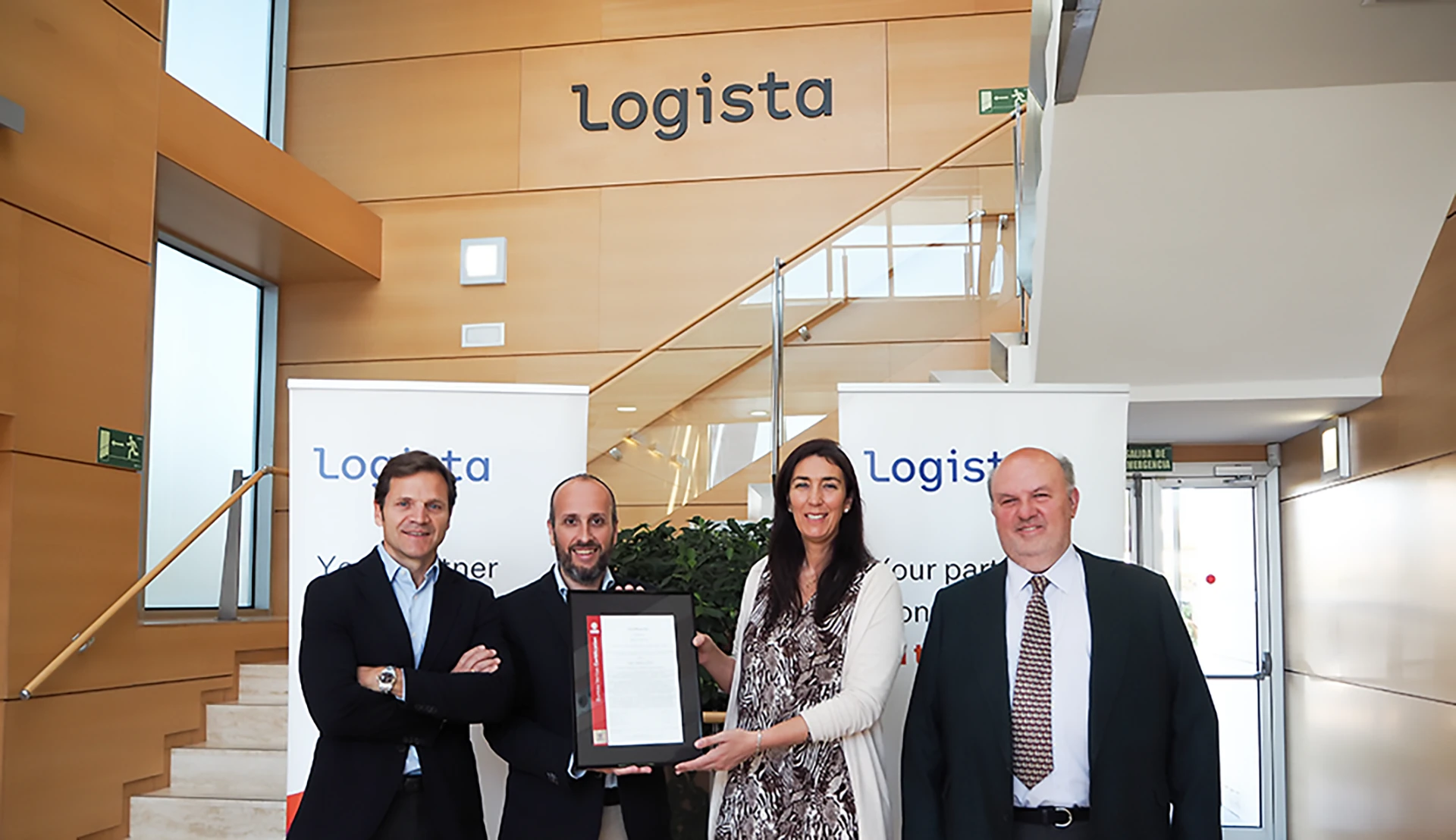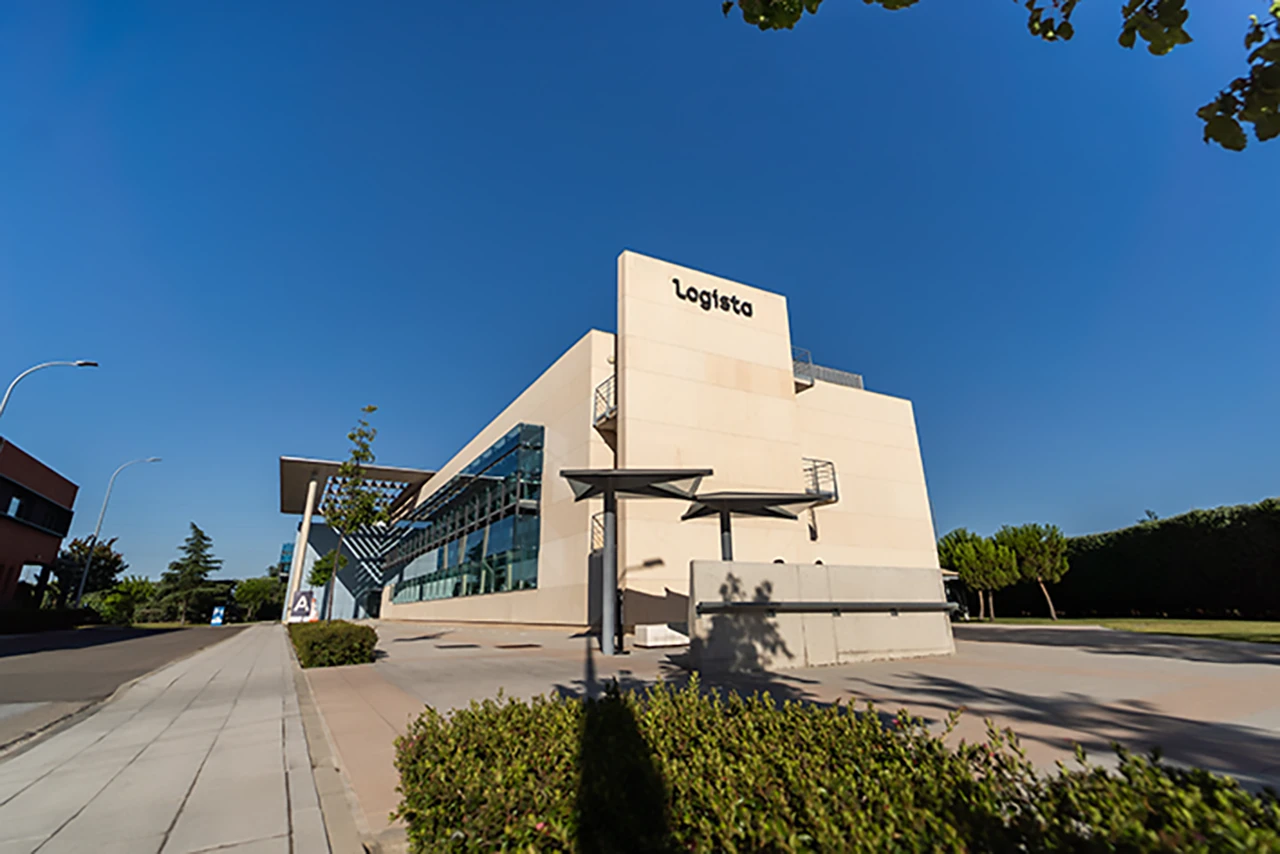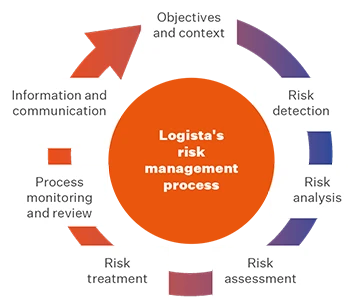4. Corporate
governance
4. Corporate
governance
GRI 2-26
The company’s corporate governance model, which is outlined clearly in Logista’s corporate governance policy, seeks to generate value in the short, medium, and long term for all its stakeholders and is based on best practices in corporate governance.
Ethics, transparency, and active communication are the core values that underpin Logista’s governance model.
In this sense, Logista is firmly committed to sustainability, in order to generate profitability for its shareholders and contribute to creating a sustainable economic system, through social commitment, growth and sustainable investment. To this end, and within the framework of Logista’s sustainability policy approved by the board of directors and available on our website, a strategic sustainability plan has been defined for three financial years (2024-2026) that includes specific aspects in terms of governance that reaffirms Logista’s commitment to good corporate governance practices.

Logista is firmly committed with sustainability
Board of directors

Duties of the board of directors
Except for matters reserved for the annual general shareholders’ meeting, the board of directors is Logista’s highest decision-making body. Its role is to represent the company by carrying out all the duties included in its corporate purpose, as set out in the articles of association.
It is the board’s policy to delegate the everyday management of Logista to the executive bodies and senior management team, focusing its own efforts on its overarching role in determining company strategy and supervising senior management. The board must also attend to any matters which, pursuant to the law or to the company’s articles of association or regulations, cannot be delegated to other bodies.
Logista’s board of directors includes an audit, control and sustainability committee and an appointments and remuneration committee, tasked with carrying out the various duties required by law. Independent directors represent the majority in these committees.
During the 2024, financial year, the company’s board of directors has held 9 meetings, the audit, control, and sustainability committee has met 6 times, and the appointments and remunerations committee has also met a total of 6 times.
Assessment of the board of directors
In accordance with the recommendations contained in the code of good governance for listed companies, the board and its committees carry out a self-assessment each year to evaluate the quality and efficacy of their performance. The chairman of the board, CEO and board secretary also undertake an assessment as part of this exercise. Every three years, this assessment is reviewed by an external advisor.
This year, and in accordance with the calendar approved by the board, the evaluation was carried out by the board itself in September 2024, based on the model carried out in 2023, The consequence has been an action plan approved by the board in which the following fundamental lines stand out:
- In order to ensure the most efficient functioning of the board, the board’s powers in matters of corporate governance have been attributed to the appointments and remuneration committee.
- Likewise, it continues to deepen in sustainability issues, increasing the reporting sessions on the subject to the full board and reinforcing existing training actions.
- In relation to the board’s competence matrix, it was agreed to consider the reinforcement of technological/ transformation and/or sustainability profiles in future appointments.
- Longer sessions have been established to encourage discussion in the board, in particular on strategic matters and future acquisition (M&A) processes, for which the content of the information provided to the board will be adjusted.
Board members’ seniority



Competencies and diversity in the board of directors
In the 2024, financial year and taking into account the changes produced in the board, the board, agreed to update the matrix of powers. The competencies identified are those indicated below and, after its analysis, the board has concluded that at a global level it has significant global experience in all the capabilities included in said matrix.
- Innovation
- Logistics business strategy and trends
- B2B and B2C (customer experience and new services)
- Operational excellence and process optimization
- Relations with regulators and other public interest groups
- International experience
- Senior management experience
- Accounting/audit/risk management
- Corporate finance
- Talent management and compensation
- Corporate governance
- Sustainability (ESG)
In addition, the board of directors has maintained its commitment to diversity. In particular, this year the board has approved a new regulation in which it has sought to continue advancing on diversity issues, adapting its terminology to the Organic Law 2/2024, of August 1st, on equal representation and balanced presence of women and men and including, explicitly, the prohibition of any discrimination on grounds of race, religion, origin, etc.
From this firm commitment to gender diversity, with the new renewals produced in the board, the percentage of women on the board of directors has increased (50%), exceeding in advance what is established in the aforementioned parity law.
Board of directors remuneration model
When determining its remuneration policy, the company considers both the relevant regulations (particularly those applicable to listed companies) and the objectives set out in its business plan, and ensures it is underpinned by the principles and recommendations of good corporate governance, market best practices and the guidelines issued by institutional investors and proxy advisors.
Every year, the company publishes information on board member remuneration in its integrated annual report, annual accounts, and annual report on board remuneration.
These remunerations are made up of a fixed monthly remuneration, which differentiates those directors who are also chairman of the board or of any committee, and an attendance fee, equal for all directors, as well as a fee for attendance at the committees for those who are members. Proprietary directors waive any remuneration as directors of the company. Only executive directors receive variable remuneration.
In order to advance the alignment of the directors’ remuneration framework with the best market practices, Logista has proceeded to review the 2023-25 remuneration policy, with external advice from Georgeson. As a result, the general shareholders’ meeting held on February 2nd, 2024, approved a new remuneration policy for directors 2024-2026 which, substantially maintaining the foundations of the previous one, proposes the following changes:
- Change in the short-term variable remuneration scheme of the secretary director, reducing the weight of the personal contribution to align it with the weight assigned to the CEO, and limiting the margin of discretion in her remuneration.
- Increase in the weight of sustainability objectives by up to 10% within the annual variable remuneration scheme of both directors, in line with the importance of sustainability commitments for the company.
- Elimination of the possibility of increasing the percentage of the annual variable remuneration by the board, leaving this power to the general shareholders’s meeting, to guarantee maximum transparency in this regard.


Key action undertaken by the board of directors in 2024
1) Business management
Throughout the year the board of directors has carried out its regular duties to establish the company’s general policies and strategies, boost operations and business plans, and monitor the performance of the business areas and their economic and financial situation. In this regard, the board is proud to report the company’s excellent results and Logista’s steadfast commitment to growth and improving its positioning across its various businesses via the acquisition of third- party companies this year, as well as its integration processes for each of these.
2) Initiatives relating to corporate governance and compliance
In September 2024, the board carried out a review of its regulations to continue advancing in the implementation of the best practices of good corporate governance and to adapt the company’s practices to the best international standards. Among this review, it should be noted that the term of office of directors has been shortened to three years and the inclusion of an obligation for independent directors to make their position available to the board once they exceed nine years of mandate, who only when the board of directors, following a report from the appointments and remuneration committee, considers that there are justified reasons for it to continue on the board, they may maintain their classification as independent.
In terms of compliance, in addition to regularly monitoring the operation of the company’s compliance system, the board has approved a human rights policy, a due diligence policy in the supply chain and a competition policy. Likewise, during this exercise, the general principles of supplier behaviour have been updated to include a specific obligation to promote respect for human rights, both in their own organisation and in their relations with third parties.
Finally, during the year, various sessions were held on sustainability reporting and training activities in this area were reinforced.
3) Development of strategic projects
The board has opted for a strategy of business diversification and inorganic growth. In this context, during the year the company’s work in the integration of the businesses acquired in previous years has been monitored and new acquisitions have been authorized.
Specifically, as previously stated, during the year several strategic operations have been completed to acquire companies: SGEL Libros, the Belgian courier company Belgium Parcel Services SRL, the remaining 30% of Speedlink and the remaining 26.67% of Transportes El Mosca.
The company continues to work on other inorganic growth opportunities, which are expected to come to fruition in the near future.
4) Risk management
The board remains committed to upholding a rigorous risk control system and systematically revises the company’s risk management model in response to changes in the business environment. This year, it has strengthened its procedures for reporting both to the audit, control, and sustainability committee and to the board.
Agenda for the 2024 annual general shareholders’ meeting
First.- Examination and approval of the annual accounts (balance sheet, profit and loss account, the statement on changes to the net equity, the cash flow statement and notes to the accounts) and the management report of Compañía de Distribución Integral Logista Holdings, S.A. and of its consolidated group, corresponding to the financial year ended September 30th, 2023.
1.1. Approval of the individual annual accounts and management report of Compañía de Distribución Integral Logista Holdings, S.A., corresponding to the financial year ended September 30th, 2023.
1.2. Approval of the consolidated annual accounts and management report of Compañía de Distribución Integral Logista Holdings, S.A. and its group, corresponding to the financial year ended September 30th, 2023.
Second.- Examination and approval of the consolidated statement of non-financial information, included in the integrated report of Compañía de Distribución Integral Logista Holdings, S.A. and its consolidated group, corresponding to the financial year ended September 30th, 2023.
Third.- Examination and approval of the management of the board of directors during the financial year closed on September 30th, 2023.
Fourth.- Examination and approval of the board of directors’ proposal of allocation of results corresponding to the financial year ended September 30th, 2023 of Compañía de Distribución Integral Logista Holdings, S.A.
Fifth.- Amendment of article 1 of the by-laws of Compañía de Distribución Integral Logista Holdings, S.A. to modify the corporate name.
Sixth.- Directors’ ratification, appointment and re-election.
6.1. Ratification and appointment of the proprietary director Mr. David Michael Tillekeratne.
6.2. Ratification and appointment of the proprietary director Ms. Julia Lefèvre.
6.3. Ratification and appointment of the independent director Ms. Teresa PazAres Rodríguez.
6.4. Appointment of the independent director Mr. Manuel González Cid.
6.5. Re-election of the executive director Mr. Íñigo Meirás Amusco.
6.6. Re-election of the executive director Ms. María Echenique Moscoso del Prado.
6.7. Re-election of the independent director Ms. Pilar Platero Sanz.
6.8. Re-election of the proprietary director Mr. Richard Guy Hathaway.
Seventh.- Examination and approval of the 2024-2026 directors’ remuneration policy.
Eight.- Examination and approval of the long-term incentive plan 2024-2026.
Ninth.- Advisory vote on the annual report on directors’ remunerations of the financial year ended on 30 September 2023.
Tenth.- Information to the general shareholders’ meeting on the amendment of articles 3.1, 3.2, 14.1, 14.3, 16.1, 16.2, 16.3, 16.4, 16.7 and 33.1 of the Board of Directors’ Regulations.
Eleventh.- Delegation to the board of directors of the necessary powers to interpret, complete, correct, develop, execute, formalise and register the foregoing resolutions and place them on public record, as well as to substitute the powers granted by the general meeting.

GRI 2-26
Ethics and anti-corruption measures
Logista’s fundamental aspects are the development of ethical and responsible business conduct and the fight against corruption and bribery. Therefore, Logista has established corporate policies, and an internal control system aimed at detecting, preventing, and mitigating criminal activities by its administrators, executives, and employees, including offences such as corruption, bribery, and money laundering.
Logista’s compliance system is founded on three basic cornerstones: (i) its code of conduct, (ii) its criminal compliance policy, and (iii) its policy for reporting improper practices (“whistleblowing”).
Main actions carried out during the year
In the realm of the compliance system, the following advances have been made during this fiscal year:
- Implementation of a compliance program related to competition defence, in accordance with the guidelines established by the National Commission on Markets and Competition (CNMC) Guide.
- Approval of a human rights policy.
- Approval of a due diligence policy in the supply chain regarding human rights and the environment.
- Update of the general principles of behaviour for Logista’s suppliers.
- Implementation of an online platform for the submission and management of complaints received through the whistleblowing channel, enhancing the security of the internal information system as provided in Law 2/2023 of February 20th, which regulates the protection of individuals who report regulatory breaches and anti-corruption efforts.
- Implementation of a third-party risk assessment tool, covering areas such as corruption risk, integrity, human rights violations, reputation, financial sustainability, or cybersecurity risks.
- Certification of the tax compliance system in Spain in accordance with the requirements of the UNE 19602:2017 standard on tax compliance management systems.
Implementation of a competition compliance program
During the fiscal year 2024, Logista implemented a compliance program concerning competition defense, in line with the guidelines established in the National Commission for Markets and Competition (CNMC), guide on compliance programs regarding competition defense norms, dated June 10th, 2020, and the UNE 19603:2023 about standard on compliance management systems in relation to free competition by the Spanish Association for Standardization, dated November 22nd, 2023.
As the central axis of this program and an explicit expression of its commitment to a culture of compliance and rejection of illegal activities concerning competition, on July 24th, 2024, the board of directors of Logista approved the competition policy, which is part of the competition compliance program and is also integrated into Logista’s compliance system.
The competition policy outlines the functions of the various participants in the competition compliance program, including the board of directors, the audit, control, and sustainability committee, the executive committee, the compliance committee, and other members of Logista, assigning to each of them their respective responsibilities and duties in relation to the program.
The competition policy provides a detailed description tailored to Logista’s activities of the different behaviours that could constitute a violation of competition regulations to express its total rejection and prohibition. The described behaviours include the following:
- Horizontal conduct (price fixing, client distribution, information exchanges, etc.).
- Vertical conduct; mainly resale price-fixing agreements.
- Abuse of dominant position.
- Business acquisitions and mergers.
To ensure its public awareness, the competition policy is accessible to all interested parties through its publication on the intranet and the corporate website www.logista.com. Additionally, its content has been included in mandatory training programmes for Logista members.
Furthermore, the competition compliance programme also includes the following elements (in addition to those that are common to Logista’s compliance system, such as the whistleblowing channel):
- Competition risk assessment, which is reflected in the inherent risk map concerning competition, from which the gross or inherent risk associated with the various sanctioning types is obtained.
- Internal controls, both general and specific, are established to mitigate the competition risks previously identified, thus obtaining the risk and control matrix in competition matters.
- Disciplinary regime.
Human rights policy
On November 7th, 2023, the board of directors approved Logista’s human rights policy, which reflects the company’s commitment to human rights and its contribution to promoting a respectful, integral, and egalitarian society by strengthening social commitment and equal opportunities.
Due diligence policy in the supply chain on human rights and the environment
On May 7th, 2024, the board of directors approved Logista’s due diligence policy in the supply chain in terms of human rights and the environment, to comply with the duty to identify, prevent and manage potential risks present in its supply chain in relation to human rights and the environment with the aim that relations with suppliers, agents, business partners and third parties are based on principles that guarantee internationally recognized fundamental rights.
It should be noted that the mention of the environment refers to those cases where an alteration in it could imply an impact on human rights.
Training
During the fiscal year 2024, Logista has continued to develop its training plan on the compliance system for its employees, including both online and in-person training on the main internal policies and procedures on these matters, including training on the code of conduct, the anti- corruption and anti-bribery policy, and the criminal risk prevention manual.
The training program also includes a series of informational videos about these policies and procedures, which were published on Logista’s intranet and are available to all its employees.
Additionally, two in-person training sessions on competition matters were held for the group’s executive committee and certain executives of Logista and its subsidiaries, aiming to increase their knowledge of the applicable legal regime and their awareness in this area.
Compliance committee
The compliance committee is the collegiate body with autonomous and independent powers of initiative and control, embodying the highest level of supervision, oversight, and control of the functioning and compliance of Logista’s compliance system.
The compliance committee is composed of representatives from the following corporate areas:
- Legal advisory, whose representative will chair the committee as compliance officer.
- Internal control, whose representative will act as secretary.
- Operations.
- Human resources.
It reports directly to the audit, control, and sustainability committee, which oversees the functioning and compliance with Logista’s organizational model.
The compliance committee meets periodically; during the fiscal year ending on September 30th, 2024, it met twelve times (same as 2023).

Main policies of the compliance system
The following are the main policies that compose and develop the compliance system, as well as the body responsible for their supervision and monitoring:
Code of conduct
It establishes the ethical standards and principles that govern our activities, sets out the behavioural requirements that all Logista members must adhere to in their daily work, and serves as the fundamental basis for Logista’s policies and procedures, all of which must be interpreted and applied in accordance with the general framework of this code.
It is published on the intranet and the corporate website, www.logista.com, to ensure its accessibility and public awareness for both Logista employees and third parties.
Criminal compliance policy
Its purpose is to promote a culture of compliance and an objective of zero tolerance towards any type of action or omission that may constitute an infringement of the applicable criminal regulations, both by the members that make up the organization, as well as by those business partners and third parties with whom Logista maintains a relationship whether commercial and/or business. It also establishes a disciplinary and sanctioning system in the event of non-compliance with its provisions, as well as with the rest of the rules of Logista’s compliance system.
It is published on the intranet and the corporate website, www.logista.com, to ensure its accessibility and public awareness for both Logista employees and third parties.
Criminal risk prevention manual
It outlines Logista’s principles and objectives in criminal risk prevention, as well as the main internal procedures and control systems established to prevent and mitigate the commission of actions that may entail a risk of criminal liability in Spain.
It is published on Logista’s intranet.
Anti-corruption and anti-bribery policy
It establishes the general guidelines and rules for the prevention of corruption and bribery in any form. It regulates interactions between Logista and third parties, whether public officials or private individuals with whom the group maintains any form of business, commercial, or professional relationship.
It is published on the intranet and the corporate website, www.logista.com, to ensure its accessibility and public awareness for both Logista employees and third parties.
Money laundering and terrorist financing prevention manual
Complements and further develops the obligations applicable to each of Logista’s companies in Spain concerning the prevention of money laundering and terrorist financing.
It is published on Logista’s intranet.
Competence policy
It is the express manifestation that compliance with competition law is not only a legal obligation, but a central element of the company’s culture and its responsibility towards its customers, suppliers and other interested parties.
It is published on the intranet and the corporate website, www.logista.com, to ensure its accessibility and public awareness for both Logista employees and third parties.
Human rights policy
Reflects the company’s commitment to this matter, allowing it to contribute to the goal of promoting a respectful, integral, and egalitarian society by strengthening social commitment and equal opportunities.
It is published on the intranet and the corporate website, www.logista.com, to ensure its accessibility and public awareness for both Logista employees and third parties.
Due diligence policy in the supply chain on human rights and the environment
Aims to comply with the duty to identify, prevent and manage potential risks present in its supply chain in relation to human rights and the environment and to ensure that relations with suppliers, agents, business partners and third parties are based on principles that guarantee internationally recognized fundamental rights.
It is published on the intranet and the corporate website, www.logista.com, to ensure its accessibility and public awareness for both Logista employees and third parties.
GRI 2-26
Whistleblowing Channel
Logista’s internal information system includes a whistleblowing channel as the ideal and essential tool for preventing and enforcing the guidelines, principles, and ethical values, as well as the laws and internal regulations adopted and applicable to Logista, in order to facilitate communication or information from its members (directors, administrators, legal representatives, executives, employees, or those subject to Logista’s authority) and legitimate third parties (shareholders, contractors, subcontractors, suppliers, interns, trainees, job applicants, former employees, etc.) regarding any illegal, irregular, or unethical conduct by Logista.
In the 2023 fiscal year, the whistleblowing channel policy was updated to align with the standard UNE-ISO 37002:2021, of whistleblowing channel management systems as well as the requirements of Law 2/2023 of February 20th, which regulates the protection of individuals who report regulatory breaches and anti-corruption efforts.
Additionally, during this fiscal year, a secure online platform for the communication of complaints of bad practices, was implemented, publicly accessible to all interested parties via the link provided on Logista’s corporate website Logista which enhances the security, confidentiality, and anonymity mechanisms of the complaints and the investigation procedure, providing even greater security to Logista’s internal information system.
The communications submitted through the whistleblowing channel must concern behaviours, actions, omissions, or acts that constitute a violation, non-compliance, or conduct contrary to the ethical principles and values, laws, code of conduct and other internal regulations applicable to Logista, defined as “malpractices.” Specifically, communications may be made about malpractices that constitute or may constitute breaches of European Union law as defined by the applicable legislation, as well as serious or very serious administrative violations or criminal acts.
The communications received through the whistleblowing channel must fall into the following categories,withoutprejudicetotheexistenceof the reported malpractice:
- Violation of human rights
- Corruption or bribery
- Money laundering and terrorist financing
- Discrimination, harassment, or other labour-related issues distinct from human resources matters
- Breach of environmental regulations
- Financial and accounting irregularities
- Non-compliance with customs and tax requirements
- Others
In the financial year ended 30 September 2024 28 complaints were received of which 93.0% were received by email, 3.5% by the new online platform and 3.5% by communication from a worker. In the 2023 financial year, we received 12 complaints, of which 91.6% were received by email, and 8.4% by post.
In Spain, complaints can be made anonymously. In other countries, complaints can also be made anonymously unless the applicable national legislation requires the complainant to identify themselves. Nevertheless, in 2024, the person who filed the complaint identified themselves in 78.6% of the cases compared to 91.6%of the cases in 2023.
Logista’s whistleblowing channel policy establishes that during the investigation procedure of malpractices, the following principles and guarantees must be adhered to:
- Confidentiality
- Non-retaliation
- Guarantee of actions
- Fundamental rights presumption of innocence
- Guarantee of proportionality, precision and security of information and personal data
The following categories represent the complaints received during the fiscal year ending on 30 September 2024:

The complaints received and assigned to the category of corruption and bribery refer to bad practices that may have been carried out to the detriment of Logista, in no case for its benefit.
During the fiscal year 2024, there were no complaints received regarding matters related to respect for freedom of association, the right to collective bargaining, discrimination in employment, forced labor, child labour or human rights violations vs. 3 received in 2023.
The assignment of the complaints to these categories does not imply recognition of the concurrence of the facts denounced.
In Spain, the management and development of the investigation procedure until its resolution is the responsibility of the compliance committee. In other countries, the investigation procedure and its resolution will be carried out by the corresponding local compliance unit in the country where the reported events took place.
GRI 2-23, 2-26
Human rights
Human rights are a material aspect of Logista; as such, we ensure their compliance.
In the sustainability policy, compliance with regulations through responsible practices in key areas such as the prevention of illegal conduct, respect for human rights, and diversity is established as one of the main values on which Logista’s business model is based.
99% of Logista’s employees operate under updated agreements and have access to workers’ committees and union representatives, allowing workers to freely access their representatives at all times. Various independent unions periodically exercise their right to meet. Operations are carried out with full knowledge by workers of the right to collective association, which is an essential tool for compliance with ILO provisions.
Compliance with the provisions of the fundamental ILO conventions and the Principles of the United Nations Global Compact is implemented in Logista through the following mechanisms, monitored by the compliance committee and other supervisory bodies:
Code of conduct: Establishes that Logista is committed to protecting and respecting human rights in all its operations, recognizing the need to avoid infringing on the human rights of others and to adequately address adverse impacts on human rights that may occur in our activities, explicitly stating that:
- All Logista members are obliged to respect the dignity and human rights of all other members and third parties with whom they come into contact during the course of their activities.
- We act with full respect for the fundamental right to freedom of association, managing relations with workers’ representatives and unions smoothly and transparently. All Logista employees have the right to decide whether to join a union or have recognized representation in accordance with applicable legislation.
- We will never use or allow the use of forced labour or human trafficking, nor will we employ minors under the age of 16, under the local minimum employment age, or under the compulsory schooling age (whichever is higher), nor will we employ minors under the age of 18 to perform any work considered dangerous or that could harm their health or safety.
- We require suppliers to meet their labour obligations with their employees, respect the labour and union rights of their employees, and pay wages that meet the legal minimum or the applicable collective agreements, whichever is higher. Human trafficking or forced labour is expressly prohibited. We also require our suppliers to promote integrity, teamwork, diversity, and trust, ensuring a fair, respectful, and harassment-free workplace, promoting a positive culture of health and safety, and prohibiting unacceptable or potentially dangerous behaviour at work.
Human rights policy: Logista seeks to embody the ethical principles it promotes, as well as exemplary business behaviours in line with the best existing practices in human rights. In line with this objective, the new human rights policy was approved in 2024, a policy that is based on the main international bases of reference established within the United Nations, such as:
- The United Nations Global Compact.
- The Universal Declaration of Human Rights, which constitutes the Universal Declaration of Human Rights, the International Covenant on Civil and Political Rights, and the Covenant on Economic, Social, and Cultural Rights.
- The fundamental rights in the eight main conventions of the International Labour Organization (ILO), as established in the Declaration on Fundamental Principles and Rights at Work.
- The United Nations Guiding Principles on Business and Human Rights (UNGPs).
- The European Social Charter.
Taking into account the potential effects that Logista’s global activity may have on the groups involved, the human rights policy explicitly commits to the following:
-
- Commitment to employees, ensuring that the relationship with them is governed by principles of justice, equity, dignity, and respect, guaranteeing the following rights:
-
-
- Fair and favourable working conditions
- Equitable and satisfactory remuneration
- Work-life balance and rest
- Freedom of association and collective bargaining
- Freedom of expression
- Respect for diversity, inclusion, and non-discrimination
- Health, safety, and well-being at work
-
- Commitment to the supply chain and modern slavery, ensuring that suppliers, business partners, and other third parties that are part of Logista’s supply chain observe strict compliance with human rights through sustainable supply chain management and internal due diligence regulations.
- Commitment to society and local communities, promoting the following rights:
-
- Minority and community rights
- Fight against corruption and bribery
- Right to a clean, healthy, and sustainable environment
Finally, the human rights policy establishes a governance model that recognises the competence of Logista’s board of directors to explicitly state the company’s commitment to human rights and the environment, assigning the executive committee the responsibility to define the strategic human rights and environmental plans in Logista’s supply chain within the framework of the company’s sustainability strategic plan.
To ensure its accessibility and public awareness, the human rights policy is available to all interested parties through its publication on the intranet and the corporate website www.logista.com.
Due diligence policy in the supply chain on human rights and the environment: During this financial year, Logista has also approved the due diligence policy in the supply chain in the field of human rights and the environment. This policy establishes due diligence principles and standards of conduct aimed at promoting that suppliers, agents, business partners, and/or third parties in relationships with Logista respect human rights, expressing the principle of “zero tolerance” towards those from whom motivated suspicion or reasonable indications of human rights violations exist, such as the following:
- Any form of torture or cruel, inhumane, degrading treatment, and/or related to modern slavery.
- Any form of forced labour, defined as any kind of work or service required of an individual under the threat of punishment and for which the individual has not voluntarily offered.
- Any form of child labour, understood as the employment of minors under the local minimum employment age or under the compulsory schooling age (whichever is higher), or of minors under the age of 18 to perform any work considered dangerous or that could harm their health or safety.
- Other serious human rights violations and abuses such as widespread sexual violence.
- War crimes or other serious violations of international humanitarian law, crimes against humanity, or genocide.
- Any form of discrimination or unequal treatment based on race, religion, gender, age, disability, nationality, sexual orientation, and/ or political opinions.
- Serious violations of labour regulations that involve unsafe and dangerous environments for workers.
- Obstruction of freedom of expression, thought, opinion, and information, reducing the diversity of opinions.
- Violation of measures aimed at achieving a healthy, clean, and sustainable environment.
To prevent these behaviours, the due diligence policy in the supply chain on human rights and the environment foresees its development through a due diligence procedure consisting of six phases:
- Cross-sectional integration of due diligence.
- Identification of real and potential adverse impacts.
- Prevention of adverse effects.
- Definition of measures to end adverse effects.
- Establishment of a grievance procedure.
- Approval of a monitoring and reporting procedure.
The due diligence policy in the supply chain on human rights and the environment is available to all interested parties through its publication on the intranet and the corporate website www.logista.com.
To reinforce the due diligence measures to be developed by the group during this fiscal year, an external provider was contracted to implement an online platform for third-party risk assessment. This platform allows the assessment of the risk associated with suppliers and third parties of the group in areas such as:
- Exposure to risks of corruption, human rights violations, or international sanctions.
- Identification of open or closed legal proceedings related to fraud, corruption, bribery, and other crimes.
- Identification of possible connections or affiliations with politically exposed persons (PEPs), companies with public participation (SOW), and any links with other close family members or associates (RCA).
- Tax havens: analysis of inclusion in lists related to tax havens.
- Compliance with sustainability obligations (ESG).
- Cybersecurity risk.
General behaviour principles for suppliers: These set out the minimum standards and basic behaviour norms that should govern the activity of suppliers both in their relationships with Logista and concerning their employees or other third parties involved in the development of their activity. During this fiscal year, a specific obligation was included for Logista’s suppliers to promote respect for human rights both in their own organisation and in their business relationships with third parties.
All suppliers must be aware of and accept the behaviour principles, which are mandatory for contracting with any of Logista’s companies. The company may terminate its contractual or commercial relationship with any supplier that does not comply with the behaviour principles or, upon breach, does not take the necessary measures to rectify the non-compliance.
Procurement standard: This standard establishes that all suppliers must be certified and have a notable economic-financial and technical capacity. Additionally, contracts will be governed, among other things, by the principle of ethical and professional conduct, whereby suppliers must behave accordingly. In particular, the obligation to evaluate suppliers in ESG matters for purchasing processes that exceed a certain established threshold has been introduced in the procurement standard. These sustainable criteria have a weight of 15% of the total valuation of each supplier, representing a relevant criterion when making new hires.
Tax management
In 2024, Logista obtained tax Compliance certification under the UNE 19602:2019 standard following an audit by the independent entity Bureau Veritas, the leader in certification, inspections and testing. This certification proves that Logista applies a tax risk management and control system that complies with a set of principles, values, standards and guidelines defining good tax conduct, so as to build relationships of trust, transparency and legal certainty both with the tax authorities and with investors, other external stakeholders and society in general.
Logista has a tax policy that has been reviewed and updated in 2023 that establishes its tax strategy, to reaffirm and make explicit its commitment to strict compliance with applicable tax regulations and to the application of good tax practices and operations with special tax significance, which must be approved by the governing bodies. Logista has zero tolerance for the use of opaque structures for tax purposes, artificial structures unrelated to its activity, and the use of entities domiciled in countries or territories that are considered to be non-cooperative jurisdictions (formerly known as tax havens).
On March 22nd, 2024, Logista approved the tax compliance management procedure applied by Logista Integral and its subsidiaries in Spain, reinforcing their commitment to comply with all customs and tax laws in order to avoid procedural and interpretative tax risks. This ensures that the relevant activities and procedures are tangible and are interpreted in line with Logista’s pre- established compliance, risk management and internal control rules.
These achievements complement Logista’s ongoing observance of the code of good tax practices since 2017 and Logista’s report on tax transparency submitted annually to the tax authorities with the aim of forging a cooperative relationship and facilitating a comprehensive, continuous view of Logista, its business performance and the consistency of associated tax approaches.
Finally, on April 23rd, 2024, Spain’s Central Office for Large Taxpayers issued a very positive evaluation of the information furnished in the FY 21/22 annual tax transparency report, as well as of the clarifications provided in the course of the analysis. The tax authorities also pointed out that this was a voluntary transparency exercise on the part of Logista that has clearly contributed to the mutual knowledge, legal certainty and reciprocal trust required of Logista’s relationship with the Tax Agency.
Profits/(losses) before tax and tax contributions are set out below for each of the countries in which Logista operates:

China joins in 2023 by integrating Transportes El Mosca. Belgium joins 2024 by integrating Belgium Parcel Services. In Spain Logista Libros is consolidated through equity method integration.

Germany, China and Belgium are not included as they are not material (0) in the data for the 2023 and 2024 financial years.
GRI 201-4
Public grants
In 2024, Logista received two grants totalling €10,756.64. These include an Ecobonus grant for maritime shipments as an alternative to road transport, and assistance for hiring staff in Portugal from the Instituto de Emprego e Formação Profissional. Additionally, during the financial year, Logista was informed of the granting of a €52,418 subsidy for the installation of photovoltaic panels at its facilities in Spain, which will be received during the year 2025. During 2023, Logista received a €910,000 grant for the acquisition of electric vehicles in Spain.
Risk management
Logista’s enterprise risk management system is a continuous and integrated risk management system to facilitate the achievement of objectives and strategy. It applies to each of the businesses and countries in which it operates, as well as to corporate management, which provides a global view of all Logista’s risks.
Logista’s corporate risk management system is set out in the company’s general risk management policy, approved by the board of directors, and last updated on September 22nd, 2021, as well as its procedures, based on the COSO ERM 2017 Framework.
The general objective of the policy is to support the board of directors and management to optimize performance, with the aim of improving capabilities to create, preserve and, ultimately, achieve the value attainment.
This policy establishes the commitments for control and management of external and internal risks, of any kind of nature that may affect Logista at any time in order to achieve its objectives.
Objetives
1
Identity and manage risk throughout the entity.
2
Delimit the risk profile or appetite.
3
Establish planned risk management measures (risk treatment).
4
Periodically monitor the risk management model.
5
Enable an efficient allocation of resoures.
6
Ensure the reliability of financial and non-financial information.
7
Establish guidelines for transparency and good corporate governance.
Risk management governance
The company’s bodies responsible for the development and implementation of the risk control and management system are:

Board of directors
- Determines the risk control and management policy, including tax risks.
- Supervises the internal information and control systems.
- Determines the level of risk to be assumed by Logista.

Audit, control and sustainability committee
- Supervises and evaluates the control and risk management systems, both financial and non-financial.
- Directly supervises the risk control and management unit.

Management committee
- Decides on the risk strategy and ensures its proper implementation in accordance with the risk management systems.
- Communicates to the risk managers the guidelines to be determined.
- Monitors the most relevant risks and makes decisions on the most important risks.
- Disseminates a risk culture among its employees.
- Advises the risk management and control unit on all relevant aspects.
- It makes, when required, a proposal of risk appetite and tolerances for approval.

Risk control and management unit (carried out through the corporate internal audit department)
- Coordinates Logista’s risk identification and assessment process, providing support to those responsible for risks in this process, supervising that the main risks are identified, assessed, and managed in such a way that they are within the risk levels considered acceptable, ensuring the proper functioning of the risk management system.
- Maintains Logista’s risk map updated.
- Cooperates with the management committee in defining Logista’s risk strategy and supports the relevant risk management decisions to be taken by the management committee.
- Ensures that the risk management system provides risk mitigating measures in line with Logista’s risk strategy.
- Periodically reports the status and evolution of the main risks, as well as the result of the process of updating and evaluating them to the management committee, as a preliminary step for reporting to the audit, control, and sustainability committee and, if applicable, to Logista’s board of directors.

Responsible for risks and processes
- Executes the risk strategy set by the management committee and all risk-related guidelines set by Logista’s organizational units.
- Identifies risk situations and opportunities affecting the achievement of Logista’s objectives within his/her area of responsibility.
- Reports its risks, through its participation in the risk reporting process established for this purpose and through the tools made available for them, and communicates any risks that emerge, the mitigating plans and actions proposed, as well as the degree of progress or implementation thereof.
- Analyzes and evaluates the identified risks faced in the achievement of its objectives, according to the available methodology.
- Defines the most appropriate response for each of its risks, identifying and/or, where appropriate, designing and defining the control activities and internal rules necessary to manage its risks.
- Ensures and promotes that the control activities designed for each of the identified risks are conducted in a timely manner.
- Supervises the implementation of the different action plans and corrective actions defined for mitigation.


Risk identification, assessment and mitigation process
In line with our commitment to digitalization and the use of technology, during the year we implemented the SAP GRC Risk Management system to integrate Logista’s risk management model.
This tool manages Logista’s risk model through its various functionalities, which will enable us to execute the different phases of risk management, from identification, analysis and evaluation to treatment and follow-up.
- Objectives and context: Logista defines its strategic objectives and the environment in which it operates, both from an internal and external point of view, taking into account the interests of its stakeholders, which affects the way it manages risks. It also defines its risk appetite, i.e., the level of risk that the company takes as acceptable during its activities, as well as its risk tolerance.
Low risk tolerance profile
- Compliance with all rules, laws and regulations and taxation by which it is affected.
Moderate risk tolerance profile
For those that allow you to:
- achieve the strategic objectives determined by Logista while keeping the level of uncertainty under control.
- maintain the highest level of assurance to shareholders.
- protect Logista’s results and reputation.
- defend the interests of shareholders, customers, and manufacturers.
Higher risk tolerance profile
- In the face of technological risks that could materialize as part of Logista’s strategy of providing logistics services with high added value and, therefore, with a high level of technological progress.
During the first quarter of the year, the management committee made its proposal for risk appetite, to the board of directors, established both, under quantitative (economic-financial) and qualitative (non-financial) criteria, and after deliberation by the audit, control and sustainability committee. The board of directors has approved and validated this risk appetite.
- Risk detection: Identification of potential events that could pose a threat to Logista’s objectives.
- Risk analysis: The risk is defined according to its causes and factors, as well as by consequences for Logista if the risk materializes. It can be classified into the following categories which include ESG risks.

- Risk assessment: The severity of the risk is estimated, in order to prioritize those situations of greatest concern, and the mitigation measures established in Logista to reduce these identified risks are evaluated, obtaining as a result the residual risk, as well as the speed at which the risk is estimated to materialize, which allows determining the position of each risk within the general risk appetite and tolerance scheme. The criteria for evaluating risk impact has the following classification:

Criteria used to determine impact
- Economic-financial
- Regulatory compliance
- Health and safety
- Impact on processes
- Reputational strategic
- Context for Logista
Risk treatment: Logista’s response to risk is analysed and categorised among the following five types of responses, which are detailed in the following table. In addition, action plans are defined when it is necessary to take additional measures for adequate risk management.
Eliminate
Mitigate
Transfer
Assume
Pursue
Eliminate
Establish any type of measure that entails a total reduction of the probability of occurrence of the risk, its impact, or both, such that the risk being addressed disappears or is eliminated.é tratando.
Mitigate
To take any type of action aimed at reducing the possible consequences arising from the materialization of a risk.
Transfer
To assign to a third party the consequences arising from the materialization of the risk.
Assume
Not to take any type of action, internalizing the possible consequences derived from the materialization of the risk.
Pursue
Taking actions that accept a higher risk in order to achieve a higher performance. When choosing to pursue risk, management understands the nature and extent of any changes required to achieve the desired performance without exceeding acceptable tolerance limits.
- Process monitoring and review: The risk management process is continuously monitored and reviewed, with special emphasis on emerging risks, evolution of risks already identified, as well as completed and materialized risks.
- Information and communication: Relevant risk information to and from all levels involved in Logista’s risk management is managed through the risk management tool.
In this regard, the management committee discussed the main risks and their response plans on a quarterly basis, as well as the most relevant risks by business (regardless of their position on the corporate risk map), which facilitates lower- level decision-making, and approved Logista’s risk map. It defined a proposed risk strategy and risk appetite, both globally and for each of Logista’s business lines, which was approved by the audit, control, and sustainability committee.
An appropriate environment and risk management philosophy are created through specific communications to senior management, the management committee, the audit, control and sustainability committee, and the board.

GRI 2-1, 2-6
Breakdown of main risks
The corporate risk map identifies risks classed by category, in accordance with Logista’s general risk management policy, for which sustainability risks are presented in aggregate.
It also includes other risks that remain relevant, even though they may be at an acceptable level, such as specific financial risks and other non- financial (environment + climate change, etc.) risks.
Environmental, social and business- related risks
Macro-economic, geopolitical and social context and changing consumer habits.
Critical
The complex macroeconomic environment, as well as the political and social context globally and locally in the countries where Logista operates, may affect Logista in the various locations in which it operates. These factors could affect Logista’s performance by subjecting the businesses to rising costs, changing consumer habits and patterns, and social events such as industry-specific or general strikes, impacting operations or triggering the need to restructure.
For Europe, FY2024 was a year marked by economic stresses, as a result of inflation and subdued growth, as well as geopolitical challenges associated with the war in Ukraine, tensions between the US and China, and energy crises and political instability in several key countries where the group operates. Although it has begun to slow down, inflation remained a key concern in a number of countries in which Logista operates. This scenario has continued to generate uncertainty as regards the pace of economic recovery in the coming months.
Logista continuously monitors the performance of its various businesses and any developments in the regulatory, social and political environment, adapting its strategy and objectives to changing conditions in the countries where it operates. The increase in costs, mainly due to higher inflation, is partly offset by rising costs for clients, in line with the contracts signed, and by the cost reduction measures and restructuring and optimisation plans put in place by Logista, along with its drive to identify synergies.
Development of other business areas.
Critical
Risks inherent in the successful expansion of Logista’s different businesses – to offset a possible faster rate of decline in the traditional tobacco market – together with a misalignment with the market with regard to sustainability policies.
The main measure is the rollout of the expansion plan, as established in Logista’s strategic plan and implemented via the recent acquisitions, such as those described in the section “Strategy”.
General situation in transport sector and lack of drivers.
Significant
The transport sector is currently a very competitive environment, one which is being exacerbated by the worsening economic climate and the potential increase in costs (fuel prices, tolls, distribution costs, salaries…), which could push prices up further, affecting the costs’ structure and as a result the product mix and profitability.
The lack of drivers, and the difficulty that Logista is having in finding new drivers that meet its requirements is another factor that affects costs and could even affect the operations of the transport businesses.
Logista specialises in providing its clients with value-add services and in the transport of high- value goods, guaranteeing the highest standards of service and making it less susceptible to potential price drops from its competitors and increasing its customer loyalty. In addition, it also has cost recovery mechanisms (transport tariffs indexed to fuel prices) and cost reduction measures in place.
The lack of drivers is dealt with by offering new drivers and transport companies approved long- term agreements that meet the standards established for all Logista’s businesses, as well as the incorporation of its own fleet, mainly via the acquisition of Transportes El Mosca.
Operational and technological risks
Cybersecurity.
Critical
Systems damage from deliberate third-party attacks. Logista is exposed to various threats and vulnerabilities due to its use of technology and information systems across all of its daily operations. This presents a risk to information security and to system continuity, and may lead to being obliged to settle certain liabilities. Logista has made provisions for these risks based on expert legal advice and the potential for transferring them to third parties. Logista’s returns from a number of financial years are currently subject to inspection with respect to certain taxes.
In discharging its fiscal obligations, the company advocates strict compliance with all applicable tax requirements. It adopts a centralised approach to monitoring and verification, ensuring that all fiscal obligations across Logista are met. To this end, it draws on support from highly reputable tax advisors and law firms when preparing its tax reports and settling taxes owed. Such advice is also sought in the event of any special transactions and when mounting a legal defence of the company’s position, should this be necessary.
Changes to Logista’s payment cycles or to fiscal policies.
Relevant
Like any other wholesale business, Logista’s purchasing, and revenue cycles are staggered. This means that outgoings to tobacco manufacturers and incomings from retail outlets may not always balance out. Moreover, Logista’s tax obligations must be settled according to a different cycle again. Changes to the tax payment cycle or significant increases in tax (primarily in excise duties) could have a negative impact on the business by weakening the financial outlook, thus affecting the company’s operating profit and cash management.
Changes to Logista’s payment cycles could force it to seek external financing in order to meet its obligations.
The businesses are developing more robust mechanisms for debt collection, with a view to shortening collection periods in business areas most exposed to client credit risk. In addition, they are lowering credit limits, monitoring credit lines more closely and seeking bank guarantees.
Impairment losses on fair value of assets, investments, goodwill and asset provisions.
Relevant
One of Logista’s basic objectives is to preserve the value of its assets by analysing and preventing risks and optimising the management of the main claims. Nevertheless, there is a risk that the fair value of assets may deteriorate, particularly with respect to the carrying value of goodwill, which is high. This is because Logista has a significant volume of assets and investments that have a substantial impact on its income statement.
The finance department analyses potential accidental risks which Logista may be exposed to, both in terms of its assets and its business operations. Accordingly, it ensures that external insurance policies are in place as appropriate and commissions property valuations. With respect to the high carrying value of goodwill, Logista carries out impairment testing in accordance with international accounting standards.




